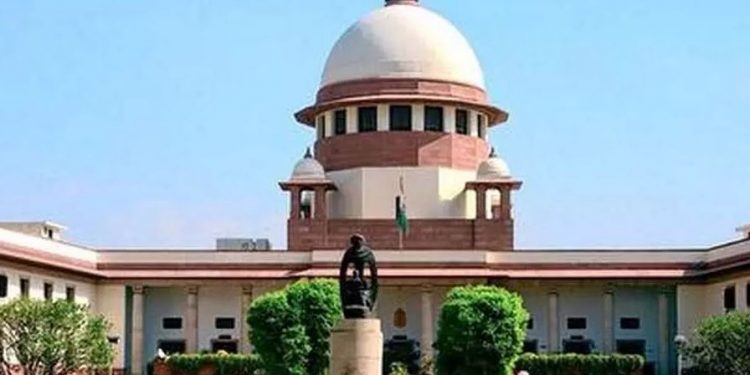New Delhi: In a significant judgement, the Supreme Court Thursday upheld the constitutional validity of Section 6A of the Citizenship Act which grants Indian citizenship to immigrants from Bangladesh who entered Assam before March 25, 1971.
Chief Justice of India (CJI) D Y Chandrachud and Justices Surya Kant, M M Sundresh, and Manoj Misra further underscored the necessity for more robust policy measures to curb illegal immigration.
Section 6A was inserted in 1985 into the Citizenship Act of 1955 following the signing of the Assam accord between the then Rajiv Gandhi government at the Centre and the agitating groups led by Prafulla Mahanta including All Assam Students Union in the state.
The verdict is believed to give a boost to those opposed to grant of Indian citizenship to immigrants who entered Assam after March 25, 1971.
According to the provision, all those who came to Assam on or after January 1, 1966, but before March 25, 1971, from Bangladesh at the time of commencement of the Citizenship (Amendment) Act, 1985, and since then are residents of Assam, can register for Indian citizenship.
As a result, the provision fixes March 25, 1971, as the cut-off date for granting citizenship to migrants, particularly those from Bangladesh, residing in Assam.
While the CJI, Justices Kant, Sundresh, and Misra upheld the constitutional validity of Section 6A, Justice J B Pardiwala dissented in a minority verdict.
Holding the cut-off date of March 25, 1971 as rational, the CJI, writing for himself, said Section 6A was included with the objective of reducing the influx of migrants to India and dealing with those who had already migrated.
CJI Chandrachud said Section 6A was not violative of Articles 6 and 7 of the Constitution, which stipulates a cut-off date for conferring citizenship to migrants from east and west Pakistan at the “commencement of the Constitution”.
“The Assam Accord was a political solution to the issue of growing migration and Section 6A was a legislative solution. Section 6A must not be read detached from the previous legislation enacted by Parliament to deal with the problem of influx of migrants of Indian origin… Section 6A is one more statutory intervention in the long list of legislation that balances the humanitarian needs of migrants of Indian origin and the impact of such migration on economic and cultural needs of Indian states,” he wrote.
The CJI said though other states such as West Bengal (2216.7 kilometre), Meghalaya (443 kilometre), Tripura (856 kilometre) and Mizoram (318 kilometre) share a larger border with Bangladesh compared to Assam (263 kilometre), the magnitude of influx to Assam and its impact on the cultural and political rights of the Assamese and Tribal populations was higher.
Noting the data on record, the CJI said the total number of immigrants in Assam was approximately 40 lakh, 57 lakh in West Bengal, 30,000 in Meghalaya and 3.25 lakh in Tripura, the impact of migrants in Assam may conceivably be greater than other places because of its’s lesser population and land area compared to West Bengal.
“Since the migration from East Pakistan to Assam was in great numbers after the partition of undivided India and since the migration from East Pakistan after Operation Search-Light (launched by Pakistani Army to curb the Bangladeshi nationalist movement) would increase, the yardstick has nexus with the objects of reducing migration and conferring citizenship to migrants of Indian origin… Section 6A is neither under-inclusive nor over-inclusive,” he wrote.
Justice Surya Kant, writing for himself and Justices Sundresh and Misra, said, Section 6A falls within the bounds of the Constitution and does not contravene the foundational principles of fraternity.
“It is held that Section 6A of the Citizenship Act, 1955 falls within the bounds of the Constitution and is a valid piece of legislation,” Justice Kant wrote.
Highlighting that statutory machinery for identification of illegal immigrants in Assam was inadequate, Justice Kant said the implementation of immigration and citizenship legislations cannot be left to the mere wish and discretion of the authorities, necessitating constant monitoring by this court.
“Although Section 6A conferred citizenship rights exclusively to immigrants arriving before this cut-off date, there seems to still be an ongoing influx of migrants through various border states of India. Due to porous borders and incomplete fencing, this unceasing migration imposes a significant challenge,” the majority verdict held.
Dissenting from the majority judgment, Justice Pardiwala held that Section 6A of the Citizenship Act was arbitrary and constitutionally invalid.
He said the open-ended nature of Section 6A had become more prone to abuse due to the advent of forged documents.
“The open-ended nature of Section 6A has, with the passage time, become more prone to abuse due to the advent of forged documents to establish, inter-alia (among other things), wrong date of entry into Assam so as to aid illegal immigrants who are otherwise not eligible under Section 6A by virtue of having entered into Assam after March 24,1971,” he noted in a separate 127-page dissenting judgement.
The judgement came on 17 petitions filed by NGO Assam Public Works, the Assam Sanmilita Mahasangha, and others.
PTI






































